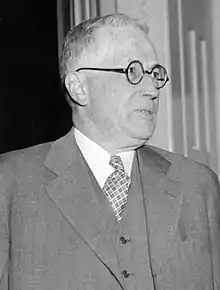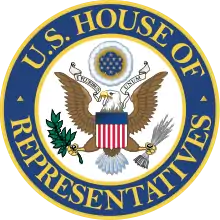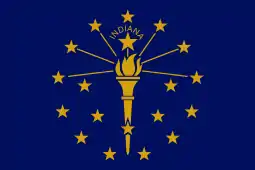Louis Ludlow
Louis Leon Ludlow (June 24, 1873 – November 28, 1950) was a Democratic Indiana congressman; he proposed a constitutional amendment early in 1938 requiring a national referendum on any U.S. declaration of war except in cases of direct attack. Congress rejected the Ludlow Amendment only by a narrow margin and after an appeal from President Franklin Delano Roosevelt.
Louis Leon Ludlow | |
|---|---|
 | |
| Member of the U.S. House of Representatives from Indiana's 11th district | |
| In office January 3, 1943 – January 3, 1949 | |
| Preceded by | William H. Larrabee |
| Succeeded by | Andrew Jacobs |
| Member of the U.S. House of Representatives from Indiana's 12th district | |
| In office March 4, 1933 – January 3, 1943 | |
| Preceded by | David Hogg |
| Succeeded by | District abolished |
| Member of the U.S. House of Representatives from Indiana's 7th district | |
| In office March 4, 1929 – March 3, 1933 | |
| Preceded by | Ralph E. Updike |
| Succeeded by | Arthur H. Greenwood |
| Personal details | |
| Born | June 24, 1873 Connersville, Indiana |
| Died | November 28, 1950 (aged 77) Washington, D.C. |
| Resting place | Rock Creek Cemetery, Washington, D.C. |
| Political party | Democratic |
| Spouse(s) | Katherine Huber |
| Residence | Indianapolis, Indiana |
| Profession | Newspaper reporter |
Personal life
Ludlow was born on a farm near Connersville, Fayette County, Indiana on June 24, 1873, as one of eight children of Henry Louis and Isabelle (Smiley) Ludlow. He was married on September 17, 1896, to Katherine Huber of Irvington, Indiana, the society editor on the Sentinel in Washington. After his tenth term in Congress, he resumed work as a newspaper correspondent until his death in Washington, D.C., at George Washington University Hospital, on November 28, 1950, at the age of 77. He was buried in Rock Creek Cemetery in Washington, DC and was survived by his wife and four children, Margery, Blanche, Virginia, and Louis.
Professional life
He moved to Indianapolis in 1892, where he became a reporter (for the Indianapolis Sun and then the Indianapolis Sentinel and the Indianapolis Press) and later a political writer. Ludlow was a Washington correspondent for Indiana and Ohio newspapers (the Indianapolis Star, the Star League of Indiana, the Columbus Dispatch, and the Ohio State Journal) and a member of the Congressional Press Galleries from 1901 to 1929. He was elected as a Democrat to the Seventy-first and the nine succeeding Congresses from 1929 to 1949.
John Rarick, an Indiana native, who served as a Democratic U.S. representative from Louisiana from 1967–1975, tried without success to resurrect the Ludlow Amendment during the Vietnam War during the administration of President Richard M. Nixon.[1]
References
- Congressional Record, September 15, 1971
External links
- United States Congress. "Louis Ludlow (id: L000501)". Biographical Directory of the United States Congress.
- Louis Ludlow at Find a Grave
| U.S. House of Representatives | ||
|---|---|---|
| Preceded by Ralph E. Updike |
Member of the U.S. House of Representatives from Indiana's 7th congressional district 1929-1933 |
Succeeded by Arthur H. Greenwood |
| Preceded by David Hogg |
Member of the U.S. House of Representatives from Indiana's 12th congressional district 1933-1943 |
District abolished |
| Preceded by William H. Larrabee |
Member of the U.S. House of Representatives from Indiana's 11th congressional district 1943-1949 |
Succeeded by Andrew Jacobs |

